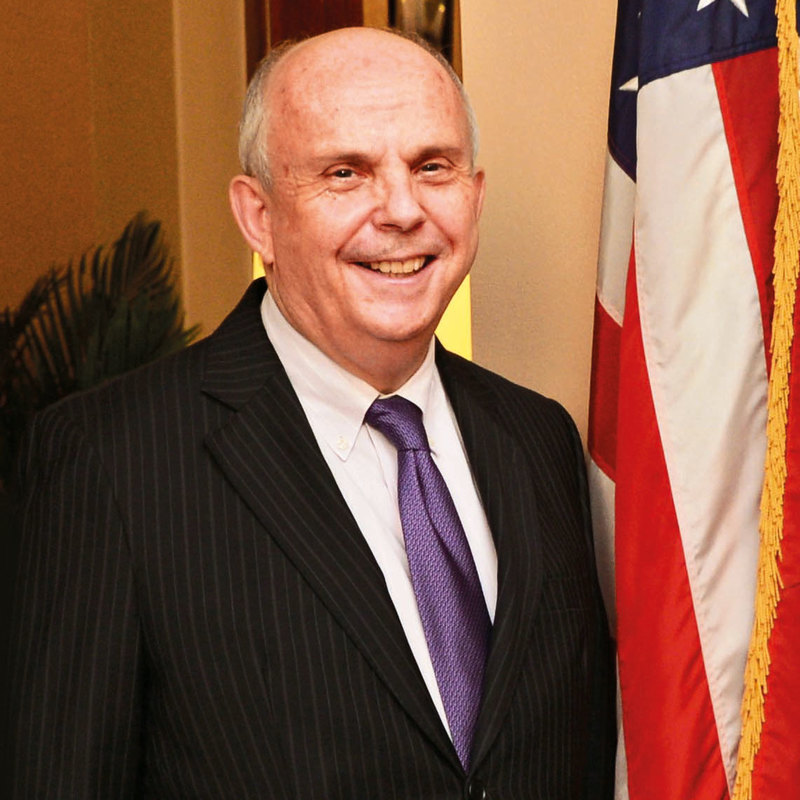
Ambassador Donovan, you recently issued a statement of congratulations on the successful election. How important was the election in the continued relationship between USA and Indonesia?
Yes, I congratulated Indonesia on this milestone in its democracy. The United States has a deep respect for Indonesia’s democratic achievements. The spirited campaigns and robust participation by Indonesia’s public, civil society, and media underscore the strength and dynamism of Indonesia’s democracy – not to mention voter turnout rates that are the envy of all democracies. The United States and Indonesia enjoy excellent relations and a strong Strategic Partnership, built on shared democratic values and common interests, including democratic elections. We look forward to working with Indonesia’s elected officials through increased economic engagement, a strong security relationship, and shared global priorities.
Indonesia and the USA are celebrating 70 years of diplomatic ties. Tell us more about the special exhibit “70 for 70” and Indonesiausa70th.com please.
This year, we are celebrating the 70th anniversary of relations between the US and Indonesia. Throughout the year, the U.S. Mission to Indonesia is highlighting places, stories, and dreams that showcase our broad partnership with Indonesia to celebrate this milestone. In conjunction with our other activities, we launched a digital platform, indonesiausa70th.com. This digital platform provides a good overview, in pictures and words, of the relationship between Indonesia and the United States – highlighting the places, stories, and dreams that showcase our broad partnership with Indonesia. The Digital Platform is a visual reminder that our relationship is a celebration of the people-to-people connections that are the foundation of our strong partnership. The Platform illustrates the work our citizens are doing side by side in tackling the challenges of the 21st century.
The special exhibit 70 for 70 serves as the core of the digital platform, and showcases all that the United States and Indonesia have in common: rich histories leading to independence, ethnic and religious diversity, and vibrant democracies. The exhibit is a celebration of the people-to-people connections that are the foundation of the strong partnership.
What is the impact of the ongoing trade dispute with China on US-Indonesia relations? Does this open new opportunities?
Indonesia has been a great partner to us. We want to be a great partner with Indonesia. It is important to emphasize that we are not asking anyone to choose between the United States and China. Like the United States, China is an Indo-Pacific country, and we would welcome their constructive participation in upholding the rules and norms of the international trading system. Among other things, this means ensuring that trade and investment is market-based, commercially motivated, and transparent.
Our Indo-Pacific strategy envisions a peaceful and secure region where all nations are sovereign, a framework for economic growth that is led by the private sector, and an emphasis on governance that encourages growth by making economies open, transparent, and rules-based. We expect all Indo-Pacific nations to be independent, strong, and satellites to none.
Indonesia is still seeking foreign direct trade investment from the USA. Are the correct factors in place to make this attractive? Perhaps some sectors are more attractive than others?
The United States wants to expand its economic engagement with Indonesia. We look to a trade and economic partnership with Indonesia that is equitable and reciprocal; supports the principles of freedom and openness; is committed to good governance; and respects local autonomy and national sovereignty.
We know that trade and investment is a key driver to any country’s growth. In 2018, U.S. bilateral trade with Indonesia was more than $29 billion. That is a good amount, but we have the opportunity to do much more. We’re in the process of updating where this relationship stands and taking stock of the role that U.S. investments play in sectors such as fintech, health and pharmaceuticals, creative industries, and renewable energy.
One great example is the U.S. support for Indonesia’s first wind farm in Sidrap, Sulawesi, which President Jokowi inaugurated last year. This project was developed by U.S.-based UPC Renewables and was made possible by the U.S. government’s Overseas Private Investment Corporation, which provided 1.6 trillion rupiah in financing. As a result of this partnership, 70,000 Indonesian households are able to enjoy clean, affordable, and reliable power.
To deepen economic cooperation, Secretary Pompeo announced 1.6 trillion rupiah for initiatives focused on sectors foundational to the Indo-Pacific’s economic future. These include initiatives in digital economy, infrastructure, and energy, areas in which Indonesia also has expressed interest.
People are at the root of our relationship. Increasing the opportunities for Indonesians and Americans to learn more about one another will only enhance our strategic partnership as we move forward.
Indonesia has a very high digital population. Are the major U.S. digital companies (Google, Amazon, Facebook, etc.) excited about the prospects here?
The United States is the birthplace of many digital technologies, but to anyone who has visited Jakarta it is evident that the future of the digital economy is taking shape here in Indonesia. U.S. companies certainly see opportunities here in Indonesia and are working closely with Indonesian companies, schools, and NGOs to realize those opportunities.
Earlier this year I attended a graduation ceremony for the first batch of students at Apple’s App Developer Academy in Tangerang. These 166 graduating students demonstrated the tremendous talent that can be found here in Indonesia through the mobile applications they developed for e-health, education, and e-commerce. And Google is committed as well to building up the talent of the Indonesian workforce with digital literacy and skills training.
Working together, U.S. and Indonesian innovators are changing every aspect of our countries’ economies for the better – making farms and factories more competitive, making cities smarter and safer, and creating new partnerships.
Indonesia is pushing hard for more tourists. Is this an area you feel positive about?
Indonesia has great potential for tourism. I have had the opportunity to travel extensively across Indonesia, from Sabang to Papua, for work and pleasure. I have enjoyed the beauty of Raja Ampat, the vivid markers of Indonesia’s rich cultural diversity in Yogyakarta, Bali, and Pontianak, and the culinary diversity Indonesia has to offer. At the core of my travels are the people I have met along the way: the individuals I have had the chance to talk with and learn from about their region, their history, and about how we can form a stronger partnership.
People are at the root of our relationship. Increasing the opportunities for Indonesians and Americans to learn more about one another will only enhance our strategic partnership as we move forward.
What aspects of the relationship are you most concentrating on – for example, trade, industry, diplomacy, or culture?
I want to strengthen all areas of cooperation between the US and Indonesia. In addition to the three pillars of our Indo-Pacific Strategy – economics, governance, and security – I am also focused on youth and education, as youth are the key to the future success of both our countries. Here in Indonesia, more than 35,000 young Indonesians participate in YSEALI, the Young Southeast Asian Leaders Initiative. Launched in 2013, YSEALI is our signature program to strengthen leadership development and networking in Southeast Asia. Through a variety of programs, including U.S. educational and cultural exchanges, regional workshops, seed funding, and professional and academic fellowships to the US, YSEALI seeks to build the leadership capabilities of youth in the region, strengthen ties between the United States and Southeast Asia, and nurture an ASEAN youth community.
With a burgeoning youth population, I also want to encourage more students to study in the United States. While the number of Indonesians studying in the United States over the past few years has been around 9,000 and is the highest in over a decade, I echo the sentiments of my Indonesian counterparts when I say that we need to do better.
You may think I’m biased, but I believe that American universities offer the best education in the world, across disciplines and fields of study. From vocational schools to community colleges and four-year universities, there is a right fit for every type of student. We also want to work with the Indonesian government to expand the Indonesia Endowment Fund for Education or LPDP so it includes more U.S. universities and promotes policies that will increase scholarship and educational opportunities and partnerships in the United States. Through EducationUSA, our free student advising service with locations across Indonesia including, we are helping students find the U.S. university or college that best fits their interests so they can develop the skills and international network to successfully enter today’s global workforce.
I would also like to remind your readers that you don’t have to go all the way to the United States to learn more about U.S. culture and our relationship with Indonesia. Just visit @america, our premier cultural center in Jakarta, or one of our nine American Corners across Indonesia to participate in some of our most popular programs.
There has been a new major commitment made by USAID to Indonesia through the Millennium Challenge Corporation. Please tell us more about that.
The Millennium Challenge Corporation (MCC) concluded its first compact with Indonesia in April 2018, through which $400 million was invested to help reduce childhood stunting and malnourishment, increase access to renewable energy, and modernize the government’s procurement system for public goods and services. The program closely aligns with the Government of Indonesia’s efforts to drive inclusive growth and fight poverty.
Last December, MCC’s Board selected Indonesia to develop a new compact in recognition of the progress Indonesia has made in the fight against corruption, strengthening democratic institutions, maintaining sound economic policies, and investing in its people. We are now in the process of working with Indonesia to develop this compact to address the key constraints to economic growth and poverty reduction.
In addition, the United States Agency for International Development (USAID) will continue its development work here, in partnership with a variety of Indonesian stakeholders, including the government and the private sector, to help Indonesia plan, finance and implement viable solutions to its development challenges.
What are your personal plans for the next 12 months?
I am grateful for the kindness that Indonesians have shown me. My family and I look forward to meeting many more people in my remaining time here. And, of course, I want to continue exploring the natural beauty and cultural diversity Indonesia has to offer.






